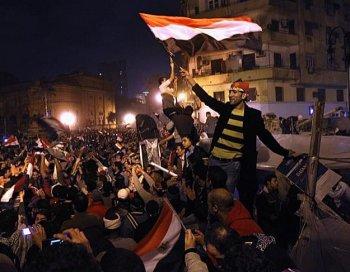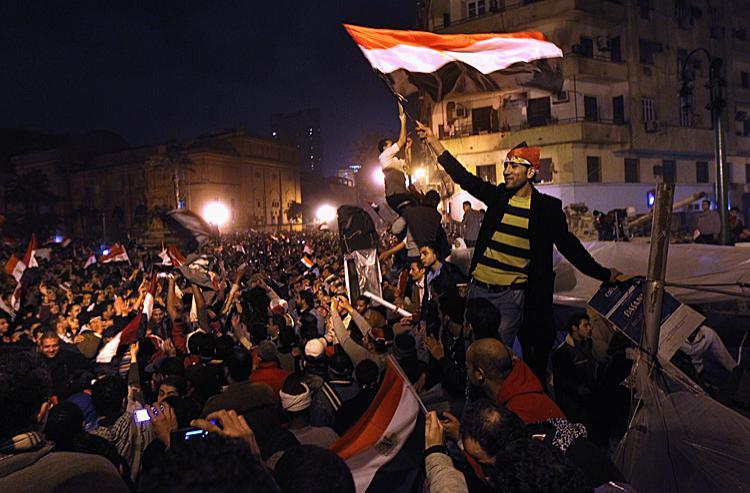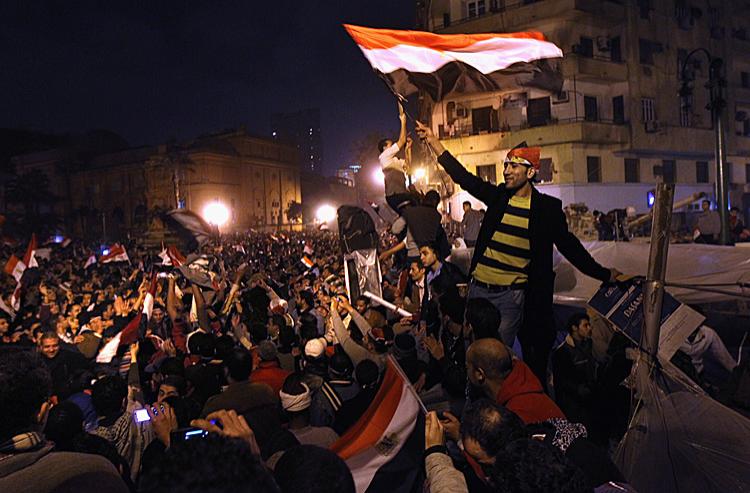What seemed impossible only Thursday in Egypt is now reality: President Hosni Mubarak is gone and the country’s hopes for democracy lie in the hands of the military. While the military in Egypt enjoys considerable support, Egypt watchers say it will have to show quick progress on its promises for openness and democracy to remain in the good graces of the country’s jubilant masses.
Alon Ben-Meir, Professor of International Relations and Middle Eastern Studies at the NYU School of Continuing and Professional Studies, is quick to point out that the military being in charge does not in and of itself signify a significant departure from the old regime, given that the military was the real power behind Mubarak all along.
Nevertheless, they are starting their tenure from a position of unique strength.
In the first place, because Egypt has mandatory military service, it is seen by many as the people’s army, the army of your brother, your best friend, and the boy next door.
Secondly, the army further strengthened its social currency over the last 17 days by allowing the demonstrations to take place. Moreover, throughout the crisis they maintained regular contact with protesters, conveying to them that the army is there to protect them and the rights of the Egyptian people.
“The most important decision the military made was the decisions not to use force against the demonstrators … to promise them that their rights have to be restored,” says Ben-Meir. “This in and of itself was quite significant.”
Ben-Meir explains that the army had two choices as events unfolded. It could have decided to support Mubarak all the way, in which case it might have been compelled to use force against demonstrators. But instead, it chose to try to persuade its commander-in-chief, President Mubarak, to make concessions.
Mubarak announced many of these concessions Thursday night, including delegating power to Vice President Omar Suleiman, agreeing to review articles of the constitution relating to the office of presidency, and of course, reiterating his promise not to run in the September elections.
Although Ben-Meir called these concessions “unprecedented,” they nonetheless fell far short of the protesters’ bottom line demand for Mubarak’s resignation.
Now that Mubarak is gone, the mood of the nation will hinge; in coming days, weeks, and months, on how well the military manages the transition, how quickly it rescinds emergency law, and if it will follow through in implementing the demands of the protesters.
“There is some opposition, but it’s very weak because Mubarak didn’t allow it to organize fully. Now they will have opportunity to do so, under the watchful eye of the military,” he says.
The strongest element of opposition currently is the Muslim Brotherhood. The military has traditionally been against the Muslim Brotherhood. However, if free and fair elections take place, there is a strong likelihood that the Islamist Party would win substantial support.
In spite of being officially banned in Egypt, Muslim Brotherhood candidates running as independents took almost 20 percent of the seats in parliament in 2005. In last December’s vote, they didn’t win any seats in an election widely considered rigged by the Mubarak regime.
How much influence the Muslim Brotherhood should have is causing some concern, says Ken Gude, a managing director with the Center for American Progress in Washington.
“The Muslim Brotherhood are no liberals, but they have engaged in the political process in Egypt peacefully for the last 30 years, and they represent a significant number of Egyptians. They certainly will play a role in the next government of Egypt,” says Gude.
Since the uprising began on Jan. 25, the Muslim Brotherhood has kept a low profile. While they did join the street demonstrations, they did not play a prominent role nor have they put forward a presidential candidate. Gude says this was a “sophisticated move” on their part, because it denied Mubarak the opportunity to play the ‘fear of a Muslim Brotherhood take over’ card as an excuse to stay in power.
Gude says it will be interesting is to see if the Muslim Brotherhood can stay intact in the lead up to the elections.
The Brotherhood is a large organization comprised of multiple factions. In the new environment of an open political system, the organization is likely to experience “internal pressure” because of this.
Rashid Khalidi, Professor of Modern Arab Studies at Columbia University thinks the Muslim Brotherhood fear factor is overblown. He says he has not seen evidence of a single Muslim slogan over the duration of the protests. Moreover, there have been incidents of violence between Muslims and Copts.
“Maybe we were sold a bill of goods,” says Khalidi.
Gude is largely optimistic about the situation. He says the army has made it clear that what is happening is a “complete reboot of the political system rather than a cosmetic shuffling around.”
“The beauty of this situation is, it is now up to the Egyptian people. They will have to make their choice about how to shape their next government … and now we have to respect that,” he said.
With reporting by Gary Du.
Alon Ben-Meir, Professor of International Relations and Middle Eastern Studies at the NYU School of Continuing and Professional Studies, is quick to point out that the military being in charge does not in and of itself signify a significant departure from the old regime, given that the military was the real power behind Mubarak all along.
Nevertheless, they are starting their tenure from a position of unique strength.
In the first place, because Egypt has mandatory military service, it is seen by many as the people’s army, the army of your brother, your best friend, and the boy next door.
Secondly, the army further strengthened its social currency over the last 17 days by allowing the demonstrations to take place. Moreover, throughout the crisis they maintained regular contact with protesters, conveying to them that the army is there to protect them and the rights of the Egyptian people.
“The most important decision the military made was the decisions not to use force against the demonstrators … to promise them that their rights have to be restored,” says Ben-Meir. “This in and of itself was quite significant.”
Ben-Meir explains that the army had two choices as events unfolded. It could have decided to support Mubarak all the way, in which case it might have been compelled to use force against demonstrators. But instead, it chose to try to persuade its commander-in-chief, President Mubarak, to make concessions.
Mubarak announced many of these concessions Thursday night, including delegating power to Vice President Omar Suleiman, agreeing to review articles of the constitution relating to the office of presidency, and of course, reiterating his promise not to run in the September elections.
Although Ben-Meir called these concessions “unprecedented,” they nonetheless fell far short of the protesters’ bottom line demand for Mubarak’s resignation.
Now that Mubarak is gone, the mood of the nation will hinge; in coming days, weeks, and months, on how well the military manages the transition, how quickly it rescinds emergency law, and if it will follow through in implementing the demands of the protesters.
Preparing for Free Elections
Elections are currently scheduled for September, a short seven months away for a nation to prepare for its first free and fair vote. In Ben-Meir’s estimation, the transitional government would be wise to postpone the date by two or three months to give the opposition time to prepare.“There is some opposition, but it’s very weak because Mubarak didn’t allow it to organize fully. Now they will have opportunity to do so, under the watchful eye of the military,” he says.
The strongest element of opposition currently is the Muslim Brotherhood. The military has traditionally been against the Muslim Brotherhood. However, if free and fair elections take place, there is a strong likelihood that the Islamist Party would win substantial support.
In spite of being officially banned in Egypt, Muslim Brotherhood candidates running as independents took almost 20 percent of the seats in parliament in 2005. In last December’s vote, they didn’t win any seats in an election widely considered rigged by the Mubarak regime.
How much influence the Muslim Brotherhood should have is causing some concern, says Ken Gude, a managing director with the Center for American Progress in Washington.
“The Muslim Brotherhood are no liberals, but they have engaged in the political process in Egypt peacefully for the last 30 years, and they represent a significant number of Egyptians. They certainly will play a role in the next government of Egypt,” says Gude.
Since the uprising began on Jan. 25, the Muslim Brotherhood has kept a low profile. While they did join the street demonstrations, they did not play a prominent role nor have they put forward a presidential candidate. Gude says this was a “sophisticated move” on their part, because it denied Mubarak the opportunity to play the ‘fear of a Muslim Brotherhood take over’ card as an excuse to stay in power.
Gude says it will be interesting is to see if the Muslim Brotherhood can stay intact in the lead up to the elections.
The Brotherhood is a large organization comprised of multiple factions. In the new environment of an open political system, the organization is likely to experience “internal pressure” because of this.
Rashid Khalidi, Professor of Modern Arab Studies at Columbia University thinks the Muslim Brotherhood fear factor is overblown. He says he has not seen evidence of a single Muslim slogan over the duration of the protests. Moreover, there have been incidents of violence between Muslims and Copts.
“Maybe we were sold a bill of goods,” says Khalidi.
Gude is largely optimistic about the situation. He says the army has made it clear that what is happening is a “complete reboot of the political system rather than a cosmetic shuffling around.”
“The beauty of this situation is, it is now up to the Egyptian people. They will have to make their choice about how to shape their next government … and now we have to respect that,” he said.
With reporting by Gary Du.







